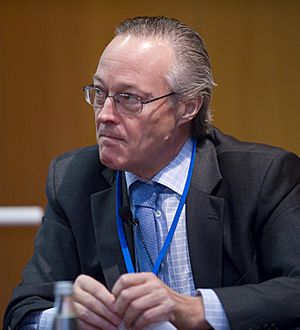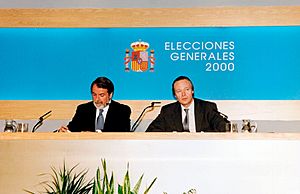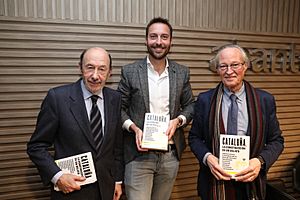Josep Piqué facts for kids
Quick facts for kids
Josep Piqué
|
|
|---|---|

Piqué in 2008
|
|
| Minister of Science and Technology | |
| In office 10 July 2002 – 3 September 2003 |
|
| Monarch | Juan Carlos I |
| Prime Minister | José María Aznar |
| Preceded by | Anna Birulés |
| Succeeded by | Juan Costa |
| Minister of Foreign Affairs | |
| In office 27 April 2000 – 10 July 2002 |
|
| Monarch | Juan Carlos I |
| Prime Minister | José María Aznar |
| Preceded by | Abel Matutes |
| Succeeded by | Ana Palacio |
| Spokesperson of the Government | |
| In office 16 July 1998 – 27 April 2000 |
|
| Monarch | Juan Carlos I |
| Prime Minister | José María Aznar |
| Preceded by | Miguel Ángel Rodríguez Bajón |
| Succeeded by | Pío Cabanillas Alonso |
| Minister of Industry and Energy | |
| In office 6 May 1996 – 27 April 2000 |
|
| Monarch | Juan Carlos I |
| Prime Minister | José María Aznar |
| Preceded by | Juan Manuel Eguiagaray |
| Succeeded by |
|
| President of People's Party of Catalonia | |
| In office 19 October 2002 – 19 July 2007 |
|
| Preceded by | Alberto Fernández Díaz |
| Succeeded by | Daniel Sirera |
| Personal details | |
| Born |
Josep Piqué Camps
21 February 1955 Vilanova i la Geltrú, Catalonia, Spain |
| Died | 6 April 2023 (aged 68) Madrid, Spain |
| Political party | PPC |
| Other political affiliations |
|
| Spouse |
Gloria Lomana
(m. 2009) |
| Alma mater | University of Barcelona |
Josep Piqué Camps (born 21 February 1955 – died 6 April 2023) was an important Spanish politician. He was a member of the conservative People's Party (PP). Piqué served as a minister in the government led by José María Aznar. He also led the People's Party of Catalonia from 2003 to 2007.
Contents
Early Life and Education
Josep Piqué was born on 21 February 1955. His hometown was Vilanova i la Geltrú in Spain. His father, José Piqué Tetas, was also involved in local politics.
Piqué was a very smart student. He earned a doctorate in Business and Economics. He also got a Law degree from the University of Barcelona.
Political Journey
Starting in Politics
When he was young, Piqué was part of some left-wing political groups. This was during the final years of the Franco's dictatorship in Spain.
He worked as a professor at the University of Barcelona. He taught there from 1978 to 1986. In 1986, the President of Catalonia, Jordi Pujol, appointed him as the Director General of Industry. He held this job until 1988 before moving to the private sector.
Minister of Industry and Energy: 1996–2000
In 1996, José María Aznar, who was the leader of the People's Party, wanted to improve his party's image in Catalonia. He wanted to connect more with businesses there. So, he contacted Josep Piqué.

After Aznar's party won the 1996 elections, he chose Piqué to be the Minister of Industry and Energy. Piqué was an independent politician at the time. He took office on 6 May 1996. His main goal was to reorganize government-owned companies. He also wanted to reduce the government's debt.
As Minister, Piqué oversaw the privatization of large public companies. These included Repsol, Telefónica, Endesa, and Aceralia. This meant these companies became privately owned.
In July 1998, he was also appointed as the Spokesperson for the Government. This showed that he was one of Aznar's most trusted advisors. In January 1999, Piqué officially joined the People's Party.
Minister of Foreign Affairs: 2000–2002
In the 2000 general elections, Piqué was elected to the Congress of Deputies. This is one of the main parts of the Spanish Parliament.
On 27 April, Aznar appointed him as the new Minister of Foreign Affairs. He left his previous roles to take on this important position.
In this role, Piqué guided Spain's foreign policy. He also led Spain's foreign relations during its six-month presidency of the Council of the European Union.
Piqué believed in a strong relationship between Spain and the United States. He supported Spain's alliance with the U.S. government. This alliance was part of the events leading up to the 2003 invasion of Iraq. Later, in 2006, he admitted that there were "very serious mistakes" in the invasion. However, he noted that many believed there were weapons of mass destruction.
Minister of Science and Technology: 2002–2003
In 2002, there was a change in the government. Piqué was replaced as Foreign Minister. He then became the Minister of Science and Technology. This ministry was in charge of the telecommunications industry.
During his time as Minister, he helped create new laws for the internet. He also promoted the General Telecommunications Law.
Many people thought he might become the next leader of the national People's Party. However, he was later sent to lead the party in Catalonia.
Leading the People's Party in Catalonia
Piqué became the president of the People's Party of Catalonia in 2002. He aimed to attract more votes for the party in Catalonia. He had good relationships with important people in Catalonia.
He made the People's Party in Catalonia more moderate. It became less focused on central government control. This allowed the party to take part in talks about a new law for Catalonia's self-governance.
He resigned from this position in July 2007. This was due to disagreements about the direction the main People's Party wanted for its regional branch.
Piqué was a member of the Parliament of Catalonia from 2003 to 2007. During this time, he also served as a senator.
Business Career
Piqué also had a successful career in business. He started in the business world in the 1980s. He worked at La Caixa bank as chief economist.

After working for the Catalan government, Piqué returned to the private sector. He became the CEO and president of the chemical company Ercros in 1989. He also chaired the company Erkimia.
From 1995 to 1996, he was president of the Cercle d'Economia. This is an important economic group in Catalonia.
Between 2007 and 2013, Piqué was the chairman of Vueling Airlines. This is a low-cost airline.
In 2008, he co-chaired the Global China Business Meeting in Madrid. He also advised the Bulgarian government on joining the European Union. In 2009, he started his own consulting firm. It was called Pangea21 Consultora Internacional.
In June 2019, Piqué joined the board of directors of Amadeus IT Group.
Personal Life
Josep Piqué was married to Margarita Montaner, and they had three children. They later divorced. In 2009, he married journalist Gloria Lomana.
People often described his speaking style as sharp and brilliant. He believed in dialogue and negotiation in politics. He was known for being a discreet and observant politician.
Josep Piqué passed away in Madrid on 6 April 2023. He was 68 years old.
See also
 In Spanish: Josep Piqué para niños
In Spanish: Josep Piqué para niños
 | Mary Eliza Mahoney |
 | Susie King Taylor |
 | Ida Gray |
 | Eliza Ann Grier |

